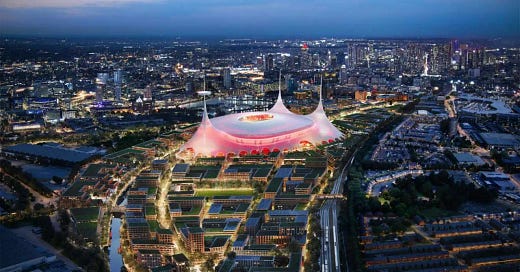The Lead Untangles: Why Labour are getting involved in Manchester United's gaudy new ground
A new ground for Manchester United - but why does support for such a mismanaged enterprise make sense for Labour? Fred Garratt-Stanley looks deeper...
At a glance facts
In a statement released by the UK Treasury in late January, Chancellor of the Exchequer Rachel Reeves committed to championing the regeneration of Manchester United's home ground Old Trafford, calling the project "a shining example" of the government's plans to boost economic growth.
This announcement came as part of a broader message on Labour's so-called 'growth mission', with other key pledges including a third runway at Heathrow Airport and the creation of a "growth corridor" between Oxford and Cambridge.
Manchester United Football Club quickly came out in support of the Old Trafford regeneration plans, but claimed that while the club would fund the redevelopment of their home stadium, "support from public bodies would be needed to unlock the wider regeneration opportunity, including improved transport infrastructure and housing."
Certain broadcasters and public figures misinterpreted the announcement, wrongly assuming that Reeves was suggesting taxpayer money would fund the redevelopment or rebuilding of Manchester United's ground. LBC host Tom Swarbric said: "It would be an outrage, wouldn't it, if that business, with all that money floating around, relied on taxpayers to put a new roof up on the Sir Alex Ferguson Stand?"
An Old Trafford Regeneration Task Force (OTRFT) was set up to flesh out the details of the redevelopment. Key figures on the OTRTF include former Manchester United defender Gary Neville, the Mayor of Greater Manchester Andy Burnham, and the World Athletics President Sebastian Coe.
On 11 March, Manchester United released a statement confirming that the club plans to build a brand-new 100,000-seater stadium in the Old Trafford area. This news came after United decided this would be preferable to renovating the current stadium. In a video showcasing the initial design plans, narrator Gary Neville marketed the new build as "a catalyst for renewal".
Context:
Situated by Salford Quays to the south-west of Manchester city centre, Old Trafford has been Manchester United's home since 1910, but 115 years of history appears to be catching up with this dilapidated venue.
United fans have been calling for investment in the club's home stadium for many years. No significant renovation work has taken place on the site since 2005, while Premier League rivals like Arsenal, Manchester City and most recently Tottenham Hotspur have all had state-of-the-art new stadiums built since the turn of the millennium.
It's hard to dispute the fact that Old Trafford is lagging behind competitors; the stadium's roof is prone to sporadic leaks, and there are rumours of a mouse infestation, with many supporters claiming the ground is no longer fit for purpose.
Legendary former players like Gary Neville and Paul Scholes have become vocal critics of the current regime's failure to invest in the stadium and the surrounding area. Rumours of a long-awaited redevelopment have repeatedly been met with cautious optimism, particularly in the context of ongoing discussions about how the UK can boost GDP.
After the club finally unveiled its plans at an architects' office in London, the future of the area is looking a little clearer.
What the regeneration will actually do:
Initial reports suggested that Trafford Council have a "masterplan" in place that will involve the clearing of "low-rise, poor quality industrial stock" that surrounds the stadium to facilitate a broader rejuvenation of the area.
According to The Athletic, the new stadium will be situated on land surrounding Old Trafford in the Trafford Wharfside area, with the regeneration project reportedly capable of delivering an additional £7.3 billion to the local economy, creating 92,000 job opportunities and building over 17,000 new homes.
In addition, Manchester United expects the regeneration of the area to create a new focal point for the city, boosting tourism by 1.8 million people per year.
It's expected that Manchester Ship Canal will be redeveloped as part of this project, with the designer of the LA-based SoFi Stadium Bryan Turbey claiming that the area between the canal and Old Trafford "could end up being the most valuable property in any large city in the world".
Evidently, this would price out many locals. But those who support the project insist that the positive benefits for the area (for example the jobs and new homes created) outweigh the negatives.
The cost of the new stadium build will be huge; The Athletic reported that the estimated cost will be at least £2 billion. This dwarfs the £1 billion Spurs recently spent building the new Tottenham Hotspur Stadium, completed in 2019.
According to Andy Burnham, none of this would be public money. Club chief executive Omar Berrada labelled it "a very attractive investment opportunity" and added "we are very confident we will find a way to finance the stadium," although the exact source of the cash is still up in the air.
What the left is saying:
"As a United fan, I hugely welcome the potential economic and social benefits that the Old Trafford redevelopment could bring to the city of Salford. But can I ask the Chief Secretary what he will do now to ensure that those who are awarded contracts are required to do all they can to employ, train and retain people from within the local area and to ensure that this ethos is mirrored across supply chains?" - Rebecca Long-Bailey, Labour MP for Salford
"The project around Old Trafford represents the biggest opportunity for urban regeneration this country has seen since London 2012 and is a key part of our 10-year plan to turbocharge growth across Greater Manchester. With our devolved powers we're mobilising the whole Greater Manchester system to lock in growth for the next decade and reap the rewards for our city-region" - Andy Burnham, Mayor of Greater Manchester
"We fully welcome these important regeneration plans, they present a really positive step for the future growth of the area… it means we can begin serious conversations about shaping the future of this part of the region." - Paul Bennett, Labour Deputy Mayor of Greater Manchester
What the right is saying:
"There is quite a big argument, in my view, for regenerating that whole south side of Manchester. The nucleus of it would be building a new world-class state-of-the-art stadium which could take English games, the FA Cup final, Champions League finals. It could serve the north of England… if we get going, I think it is a five-year project rather than a 10-year" - Sir Jim Ratcliffe, Manchester United's tax-dodging billionaire owner
"A farewell to Old Trafford — and a significant moment in British sporting history — now looks increasingly likely… a world-leading new venue would maximise potential and serve as the centrepiece of one of the biggest regeneration projects Britain has ever seen." - Mike Keegan, Daily Mail
"All the Prime Minister's ideas are the ones that we thought up. He needs to make sure that we deliver growth now, as well as in the future. To grow our economy, we must get more people off sickness and welfare, and into work." Kemi Badenoch, Conservative Party leader speaking in the Commons about Labour growth plans
What happens next:
Now the decision has been made to opt for a full stadium rebuild in the Old Trafford area, Ratcliffe is aiming to get things moving. He envisages this being a five-year plan that would see United move into their new home for the 2030/31 season.
This speedy build would rely on using prefabricated structures produced off-site and then pieced together on Trafford Wharfside after being transported up the Manchester Ship Canal. This modular process would speed things up; however, in-depth planning proposals also need to be submitted and it's currently unclear exactly where the funding for the project will come from.
Whenever the new 100,000-seater stadium is built, it will become the UK's biggest sports stadium. Due to the prestige this affords the club, the current state of Old Trafford, and the potential of regeneration for Manchester, the Manchester United Supporters' Trust (MUST) and other fan groups have expressed support for these plans.
However, the five-year target remains ambitious. Other Premier League clubs such as Tottenham and Everton faced numerous obstacles and delays during the construction of their stadiums, and given the scale of the new Old Trafford plans it is highly plausible that Manchester United will face similar challenges.
About The Lead Untangles: In an era where misinformation is actively and deliberately used by elected politicians and where advocates and opposers of beliefs state their point of view as fact, sometimes the most useful tool reporters have is to help readers make sense of the world.
The Lead Untangles is delivered each Friday by The Lead and focuses on a different complex, divisive issue with each edition.
About the author: Fred Garratt-Stanley is a freelance journalist who writes about culture, politics, football, and pubs. He's based in London and has written for a wide range of publications including The Lead, The Guardian, NME, Huck, and Pellicle.








